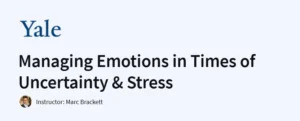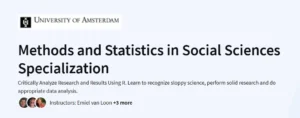What will you learn in Formación docente basada en la práctica para desarrollar habilidades del siglo XXI Course
Develop emotional intelligence for modern teaching environments.
Apply mindfulness and empathy to classroom dynamics.
Strengthen relationships with students, parents, and colleagues.
Understand and regulate your emotions in stressful school contexts.
Program Overview
Module 1: Introducción a las habilidades socioemocionales
⏱️ 1 week
Topics: What are socio-emotional skills? Importance in the 21st-century classroom.
Hands-on: Self-evaluation activity and reflection exercises.
Module 2: Autoconocimiento y autorregulación
⏱️ 1 week
Topics: Emotional self-awareness, stress management, cognitive flexibility.
Hands-on: Emotional diary and breathing exercises.
Module 3: Empatía y comunicación efectiva
⏱️ 1 week
Topics: Perspective-taking, active listening, conflict resolution.
Hands-on: Classroom simulation videos and empathy-building practice.
Module 4: Colaboración y relaciones interpersonales
⏱️ 1 week
Topics: Building trust with peers, teamwork, student-teacher connection.
Hands-on: Collaborative project plan.
Module 5: Bienestar docente y resiliencia
⏱️ 1 week
Topics: Teacher self-care, burnout prevention, long-term emotional resilience.
Hands-on: Personal wellness plan and resilience journal.
Get certificate
Job Outlook
Emotional intelligence is a key differentiator in modern education roles.
Growing demand for teachers skilled in mindfulness, empathy, and conflict resolution.
Skills gained apply to leadership, counseling, and school management positions.
Supports better student outcomes and stronger classroom environments.
Specification: Formación docente basada en la práctica para desarrollar habilidades del siglo XXI
|
FAQs
- Provides strategies for empathetic communication with students.
- Teaches active listening and perspective-taking to understand issues.
- Offers practical exercises simulating conflict situations.
- Encourages collaborative problem-solving techniques.
- Supports creating a positive and respectful classroom environment.
- Focuses on emotional intelligence to connect with students.
- Teaches mindfulness practices to stay present during lessons.
- Offers methods to foster inclusive and participative classrooms.
- Provides strategies for personalized feedback and encouragement.
- Supports building trust and strong relationships with learners.
- Includes modules on self-awareness and emotional regulation.
- Teaches stress reduction techniques like mindfulness and reflection.
- Encourages planning personal wellness routines.
- Provides tools for long-term emotional resilience.
- Supports balancing professional responsibilities with self-care.
- Emotional intelligence and empathy are key for managing teams.
- Techniques for effective communication enhance staff collaboration.
- Supports conflict resolution and relationship-building at the school level.
- Encourages mindfulness to improve decision-making and leadership presence.
- Provides a foundation for mentoring and guiding colleagues.
- Emotional and social skills enhance online classroom engagement.
- Techniques for active listening and empathy apply in virtual interactions.
- Mindfulness practices support presence and focus during remote teaching.
- Strategies for collaboration can be adapted to online group work.
- Helps maintain strong teacher-student connections even in digital settings.





